CWEG Successfully Co-hosted the Sino-Ducth Ecological Summit Forum 2018
2018-06-06——CWEG serves as the Chief Editor of national standards and guidance for underground WWTP.
The Sino-Dutch International Summit Forum on Eco Environmental Technology 2018 (also known as “the Sino-Ducth Ecological Summit Forum 2018”) co-hosted by CWEG and Tsinghua University""s School of Environment kicked off on June 5, 2018, the day when the World Environment Day 2018 took place. Themed “Green Infrastructure and Water Environment Improvement”, the forum gathered more than 10 expert scholars, entrepreneurs and government leaders of the water treatment industry to discuss and exchanged views on the “Water Treatment Technology of the Future” and “Green Infrastructure Construction”, in a bid to promote water infrastructure construction and water environment improvement in China. CWEG Chairman Hou Feng and Dr. Pang Hongtao, Deputy General Manager of Beijing Technology R&D Center under CWEG, were invited to deliver keynote speeches.
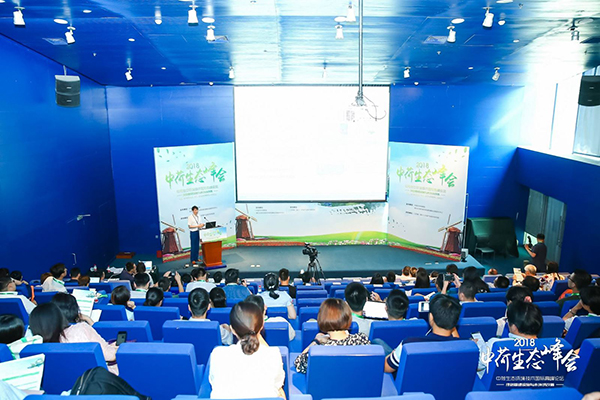
Lecture Hall, School of Environment, Tsinghua University
Participants also included Professors Jules van Lier and Robbert Kleerrbezem at Delft University of Technology, Zhang Yue, Director of Water Industry Branch of China Civil Engineering Society, Zhang Linwei, former Deputy Director of the Urban Construction Department of the Ministry of Housing and Urban-Rural Development, Liu Shuming, Vice Dean of School of Environment, Tsinghua University, Professor Wang Kaijun at Tsinghua University’s School of Environment, Cao Yeshi, former Chief Expert of Singapore""s Public Utilities Board (PUB), Liu Yongding, Investigator of the Research Group of Environmental Biology of Algae at Institute of Hydrobiology, Chinese Academy of Sciences, Professor Kong Hainan of the School of Environmental Science and Engineering (ESE) at Shanghai Jiaotong University (SJTU), Wang Bin, General Manager of Sichuan Science City Tianren Environmental Protection Co., Ltd., Wang Yongjin, Chief Engineer at Eternal Estate Engineering Design Co., Ltd., and CWEG Vice President Fang Yong, etc.
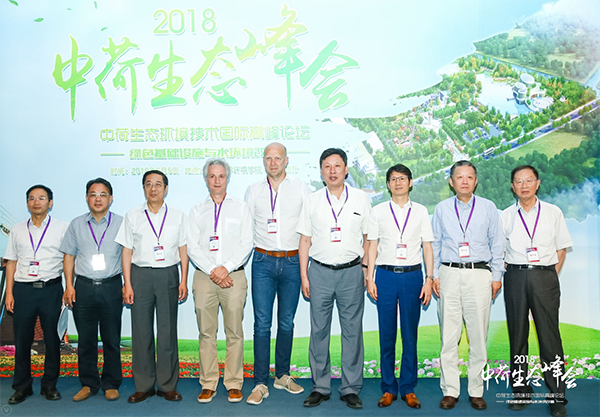
Participants took a group photo
Liu Shuming, Vice Dean of School of Environment, Tsinghua University, said in his address that the just-concluded National Conference on Ecological and Environmental Protection has called for greater efforts to solve ecological and environmental problems and unswervingly win the battle against pollution prevention and control, in a bid to push China""s ecological civilization construction to a new level. In particular, the fact that many urban water treatment infrastructure in China is gradually aging has imposed higher requirements for environmental technology innovation and ecological environment improvement.
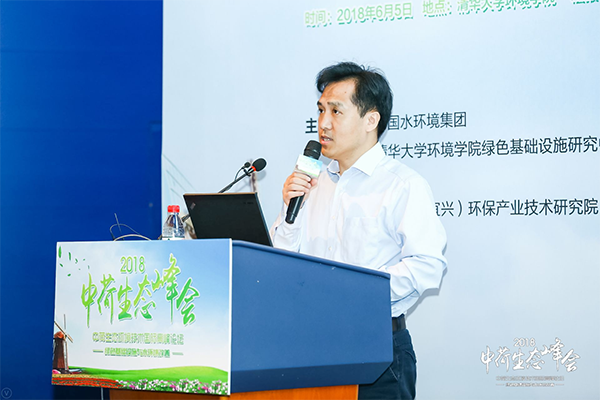
Liu Shuming, Vice Dean of School of Environment, Tsinghua University
According to a source, the Green Infrastructure Research Center of Tsinghua University’s School of Environment, established in 2016, aims to strengthen green infrastructure investment and deployment to respond to the newest needs of the times relying on the existing interdisciplinary research advantages of various education & research institutes under Tsinghua University. Working in partnership with leading enterprises and public institutions at home and abroad, the Green Infrastructure Research Center will build itself into an influential green infrastructure platform in its industry, for conducting basic researches and engineering practices with respect to the underground WWTP-based urban ecological complex and the WWTP of the future, etc.
Professor Wang Kaijun at Tsinghua University’s School of Environment delivered a speech entitled “Development and Innovation of Wastewater Treatment Technology under the Guidance of Ecological Civilization”. “The concept of ecological civilization has made its appearance both at the 17th and 18th CPC national congresses. In the view of Dr. John B. Cobb, Jr. at the American Academy of Arts and Sciences (AAAS), China should seize firmly the great opportunity brought on by ecological civilization, which differs from industrial civilization and sustainable development in that it emphasizes the concept itself and the harmony between man and man, man and nature, man and society, inducing a virtuous circle,” Wang noted.

Professor Wang Kaijun at Tsinghua University’s School of Environment
Citing the water environment management examples of Jiangsu Yixin and Dali Erhai Lake, Wang Kaijun held that ecological civilization should be built on the construction of ecological complex, a synthesis of science and technology, ecological friendliness, recreation and green development. WWTP building forms the foundation of ecological civilization, design elements such as water treatment technology, ecological landscape, community service, urban agriculture and cultural creativity are then added.
Zhang Yue, Director of Water Industry Branch of China Civil Engineering Society, shared the water strategy of Xiongan New Area, saying that the area’s water resources bring both advantages and disadvantages, and the current goal is to strike a water resource balance at maximum, by giving priority to water protection and conservation, putting pollution control at the core, and highlighting spontaneous ecosystem recovery. The key to successful water environment management will be governing the people, namely the pollution producer.
Zhang Yue, Director of Water Industry Branch of China Civil Engineering Society, shared the water strategy of Xiongan New Area, saying that the area’s water resources bring both advantages and disadvantages, and the current goal is to strike a water resource balance at maximum, by giving priority to water protection and conservation, putting pollution control at the core, and highlighting spontaneous ecosystem recovery. The key to successful water environment management will be governing the people, namely the pollution producer.
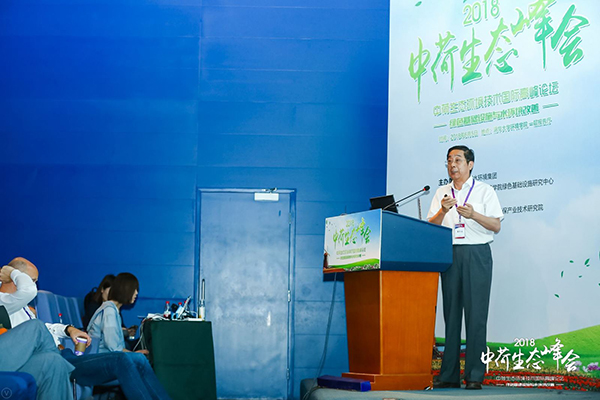
Zhang Yue, Director of Water Industry Branch of China Civil Engineering Society
At the forum, Professors Jules van Lier and Robbert Kleerrbezem from Delft University of Technology respectively shared the Netherlands’ latest scientific achievements and typical cases in wastewater treatment, as well as the challenges confronting its existing technologies.
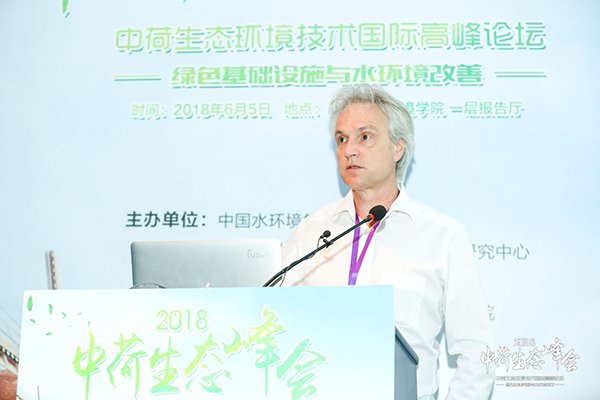
Professor Jules van Lier from Delft University of Technology

Professor Robbert Kleerrbezem from Delft University of Technology
CWEG Chairman Hou Feng, who is also the Ph.D. in Environment at Tsinghua University’s School of Environment, delivered a keynote speech entitled “Model Innovation and Development of Underground WWTP System”. According to him, as a result of rapid urbanization, the WWTPs are now surrounded by cities and occupy a large amount of land resources, emitting annoying noises and odors that seriously impact people""s lives and surrounding environment, especially the city image and the development of surrounding industries. Fortunately, the underground WWTP provides the solution by virtue of its characteristics of “eco-friendliness, land intensiveness and resource utilization”
At present, the underground WWTPs invested, designed, built and operated by CWG boast the top 1 treatment capacity of more than 2.6 million t/d worldwide, and have been deployed in provinces and cities such as Beijing, Shangha, Guizhou, Sichuan and Yunnan, turning traditional WWTPs known as “negative assets ” of cities into “positive ones”.
“China needs to learn from foreign countries for their advanced technologies in terms of water environment management, and at the same time, explore a route with its own characteristics and adaptive to China’s actual situation,” Hou said.
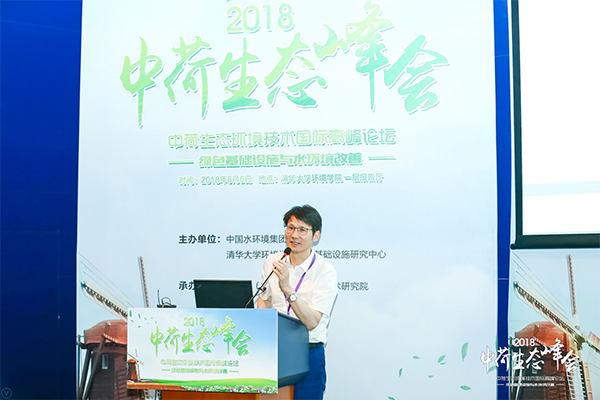
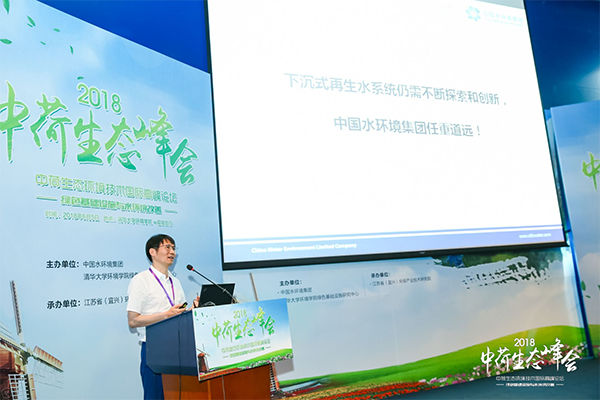
CWEG Chairman Hou Feng
At the forum, Dr. Pang Hongtao, Deputy General Manager of Beijing Technology R&D Center under CWEG, made an in-depth analysis of typical underground WWTP upgrading cases. The Beijing Bishui Underground WWTP, featuring the hardest-upgrade but the fastest-completion of its kind in China, produces effluent meeting the highest national discharge standard, and is the first demonstration project in which China’s own proprietary technology exceeds and supersedes the previously used foreign technology. The project overcomes the disjunction between water treatment infrastructure and surrounding environment protection, extends the function of water treatment infrastructure, and builds the “Bishui Ecological Complex”. In this complex, a virtuous cycle is triggered to reconcile municipal infrastructure construction with urban development by incorporating wastewater treatment facilities, ecological landscape, public services and other functions in an organic way.
According to Dr. Pang, CWEG has been committed to technology R&D over the past three years. Besides undertaking a major 13th Five-Year water project, the “Advanced Treatment and Utilization Technology for Municipal Wastewater” National Engineering Laboratory project jointly declared by CWEG also got approved in 2016. Also, CWEG has partnered with academicians Wang Hao and Peng Yongzhen to set up academician workstations. Last year, CWEG joined hands with RWTH-Aachen University to establish the Sino-German Centre for Water And healTh researCH (WATCH), and this year, it plans to work with RWTH-Aachen University’s Development and Assessment Institute in Waste Water Technology (PIA) on jointly building the decentralized wastewater treatment facility testing and assessment platform in China.
“We hope that through our continuous efforts, the enterprises"" water treatment technology can be advanced constantly, so as to make more contributions to the industry,” Dr. Pang said.

Dr. Pang Hongtao, Deputy General Manager of CWEG Beijing Technology R&D Center
At the forum, experts, scholars and entrepreneurs shared relevant successful cases of wastewater treatment infrastructure, as well as the exploration and prospect of future water treatment technology. The forum provides an eco environmental technology exchange platform for China and the Netherlands, pooling the wisdom of the government, academia and industry to contribute to China""s green infrastructure construction and water environment improvement.
 中国水环境集团
中国水环境集团









